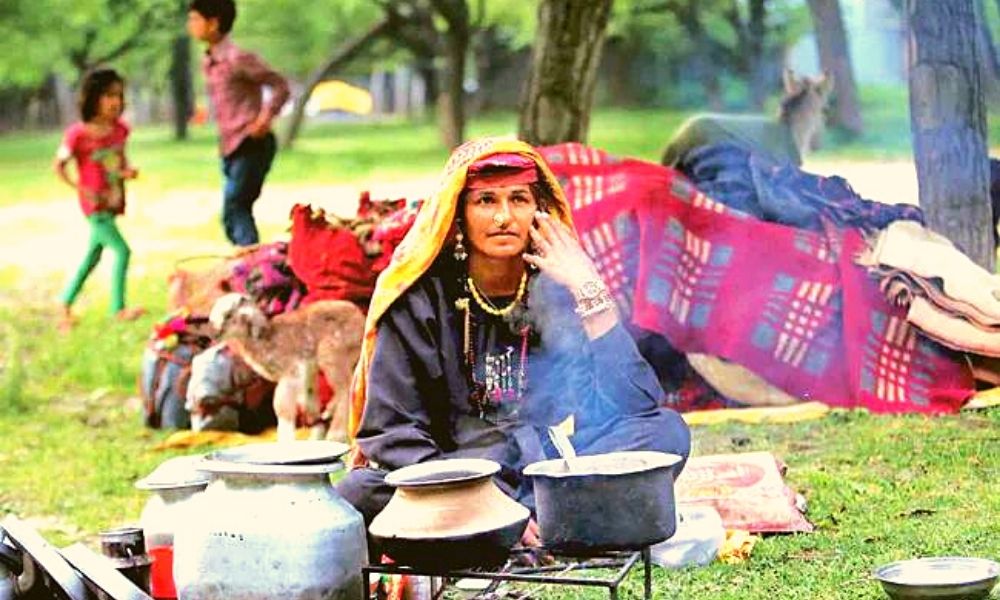
Image Credits: India Today
Stigma Keeps Kashmir's Nomadic Women From Accessing Their Reproductive Rights
Jammu and Kashmir, 6 July 2021 11:05 AM GMT
Editor : Sanal M Sudevan |
Keen to explore new things and learn something new every day in the field of jounalism.
Creatives : Tashafi Nazir
For most people, journalism sounds hectic and chaotic. For her, it's a passion she has been chasing for years. With an extensive media background, Tashafi believes in putting efforts on presenting a simple incident in the most interesting way.
Gujjar-Bakerwals account for more than 20% of Jammu and Kashmir's population and is considered the third-largest ethnic group, after Kashmiris and Ladakhis.
Amid the dense forests of the Aru valley, around 12 kilometre from the tourist hill station of Pahalgam in south Kashmir, lies mud huts dotting the steep Himalayan slopes. About 50 families from the Muslim tribal community called as Gujjar-Bakerwals reside there.
Reshma, a 30-year-old woman, is one among them. She and her husband and three kids reside in a small two-room house made out of the mud. Reshma is seven months pregnant with her fourth child now.
"I was married off when was about 16. I have two sons, aged 12 and 10, and an eight-year-old daughter. I also had a miscarriage twice," she said.
The condition of these people is quite regressive and backward when it comes to the facilities and accessibility. According to the Constitution, Gujjars belong to a "Scheduled Tribe", an official designation for India's most underprivileged socioeconomic groups. Socially and economically marginalised, they mostly earn their livelihood by cutting trees in the forests, rearing cattle, and working as pony riders and labourers. But when it comes to awareness regarding family planning, the condition is no better.
The Stigma
"Most of the women in our community have more than five children on average. This is quite normal here," Reshma says, adding the stigma and uneasiness that comes with it makes it difficult for them.
"I can't even think of discussing birth control with my husband. He would beat me up for sure. We don't dare to decide when and how many children we want. Such women are labelled as shameless in our community," she says.
Lack of proper health facilities and basic sanitation amid poverty make it even more difficult for thousands of tribal women, especially in winters, more challenging. During the harsh winter season in Kashmir, some make way to the south in Jammu for warmer climates, but some prefer to stay in Kashmir. They walk for days or even months along with their cattle and families.
In the absence of amenities, pregnant women are often carried on cots through the hilly terrains to hospitals during childbirth.
Health Complications
Sakeena, a tribal woman in her early 30's and a mother of five kids, said giving birth to back-to-back children without any gap has deteriorated her health big time. Due to the socio-cultural barriers, the women have limited fertility control choices available. Sakeena says she has never used anything for birth control till now.
"Over these years, I became fragile and had many health complications. Our work is physically demanding, rearing cattle, working in the fields, collecting woods from the forests, besides taking care of so many children. Sometimes, I feel I will collapse and die," Sakeena said.
Dr Beenish, a gynaecologist working at a rural hospital in South Kashmir, said that the lack of medical facilities is proportional to complications in pregnancies, which is more prevalent in nomadic women.
"Most of the women agree with birth control for the sake of health. But the husbands in these cases are adamant. They fight with us sometimes, saying this is their personal matter. Some cite religious reasons to support their argument," she said.
As per a government census, Gujjars account for more than 20% of Jammu and Kashmir's population and is considered the third-largest ethnic group, after Kashmiris and Ladakhis.
Recent research by the University of Kashmir states that unwanted pregnancy infections and complications are higher among women coming from lower socioeconomic statuses. It said women's reproductive biology, combined with poverty, results in women bearing the more significant burden from unsafe sex.
The report titled "Assessment and Understanding of Gujjar and Bakerwal Women's Health in Jammu And Kashmir" stated, "Gujjar and Bakerwal women are subject to risks related to pregnancy and childbearing where fertility is high and basic maternity care is not available. They are particularly vulnerable and do not get proper care and a balanced diet during pregnancy."
According to the National Health Policy of India 2017, emergency contraception should be provided at various levels of the health system besides the other contraceptive methods. However, due to family restrictions and social taboos, reproductive rights are hardly accessed.
 All section
All section














